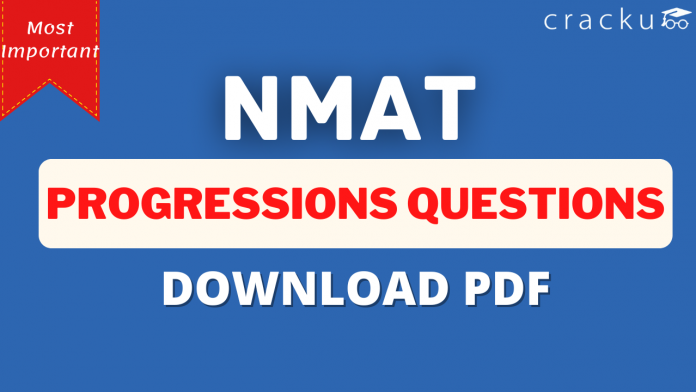Progressions Questions for NMAT:
Download Progressions Questions for NMAT PDF. Top 10 very important Progressions Questions for NMAT based on asked questions in previous exam papers.
Download Progressions Questions for NMAT
Take NMAT mock test
Question 1: The product of three positive numbers is 64. What is the minimum value of the sum of the three numbers?
a) 10
b) 14
c) 12
d) None of the above
Question 2: What is the sum of the first 25 terms of the series 1, 4, 11, 24, 45,…?
a) 12455
b) 37895
c) 32986
d) 35425
Question 3: What is the sum of the first 20 terms of the series 1, 3, 7, 13, …?
a) 1390
b) 2350
c) 2680
d) 2580
Question 4: What is the sum of the series 1+$\frac{2}{4}$+$\frac{3}{8}$+$\frac{4}{16}$+…?
a) $\frac{5}{2}$
b) $\frac{9}{8}$
c) $\frac{6}{5}$
d) None of the above
Question 5: The 288th term of the series a,b,b,c,c,c,d,d,d,d,e,e,e,e,e,f,f,f,f,f,f… is
CAT[2003] (L)
a) u
b) v
c) w
d) x
Question 6: If the sum of the first 11 terms of an arithmetic progression equals that of the first 19 terms, then what is the sum of the first 30 terms?
CAT[2004]
a) 0
b) -1
c) 1
d) Not unique
Question 7: For a Fibonacci sequence, from the third term onwards, each term in the sequence is the sum of the previous two terms in that sequence. If the difference in squares of 7th and 6th terms of this sequence is 517, what is the 10th term of this sequence?
CAT[2001]
a) 147
b) 76
c) 123
d) Cannot be determined
Question 8: Consider a sequence where the $n^{th}$ term, $t_n = n/(n+2), n =1, 2, ….$ The value of $t_3 * t_4 * t_5 * …..* t_{53}$ equals.CAT[2006]
a) 2/495
b) 2/477
c) 12/55
d) 1/1485
Question 9: Consider the sequence of numbers $a_1, a_2, a_3$……. to infinity where $a_1 = 81.33$ and $a_2 = -19$ and $a_j = a_{j-1} – a_{j-2}$ for $j > 3$. What is the sum of the first 6002 terms of this sequence?CAT [2004]
a) -100.33
b) -30
c) 62.33
d) 119.33
Question 10: What is the harmonic mean of the roots of the equation $10x^2 + 4x – 3 = 0$?
a) 3/2
b) 2/3
c) 4
d) None of the above
Join 14K MBA Aspirants Telegram Group
Download Highly Rated MBA preparation App
Answers & Solutions:
1) Answer (C)
AM >= GM =>
Let the three numbers be a,b and c.
(a+b+c)/3 >= ${a*b*c}^{1/3}$
a*b*c=64
(a+b+c)/3 >= $64^{1/3}$ =>
a+b+c >= 4*3 = 12
2) Answer (D)
If the first order difference is constant, we can assume the terms of the series as $(an + b)$
If the second order difference is constant, we can assume the terms of the series as $(an^2 + bn + c)$
If the third order difference is constant, we can assume the terms of the series to be $(an^3 + bn^2 + cn + d)$ and so on.
The first order differences of the given series are 3, 7, 13, 21,…
The second differences of the given series are 4, 6, 8, …
The third order differences of the given series are 2,2,2,2…. which is constatnt.
So, the nth term of the series can be written as $an^3+bn^2+cn+d$
Substituting the values n = 1, 2, 3 and 4, we get
a+b+c+d = 1
8a+4b+2c+d = 4
27a+9b+3c+d = 11
64a+16b+4c+d = 24
=> 7a+3b+c = 3
=> 19a+5b+c = 7
=> 37a+7b+c = 13
=> 12a+2b = 4
=> 18a+2b = 6
6a = 2 => a = 1/3
b = 0
c = 3 – 7/3 = 2/3
d = 0
So, the nth term is $(1/3)n^3 + (2/3)n$
Sum upto n terms is given by $(1/3)({\frac{n\times(n+1)}{2}})^2 + (2/3)\frac{n\times(n+1)}{2}$
So, the sum of the first 25 terms = (1/3)*25*25*26*26/4 + (2/3)*25*26/2
= 35425
3) Answer (C)
The differences of the terms are – 2, 4, 6, 8, …
The differences are in AP
Let the nth term of the series be $an^2 + bn + c$
Putting n = 1, a+b+c = 1
Putting n = 2, 4a+2b+c = 3
Putting n = 3, 9a+3b+c = 7
=>3a+b = 2 and 5a+b = 4
=>2a = 2 => a = 1 and b = -1 and c = 1
So, the nth term is $n^2 – n +1$
Sum of n terms=$\sum n^2 – n +1$
=$\frac{n(n+1)(2n+1)}{6}-\frac{n(n+1)}{2}+n$
Sum of the first 20 terms = 20*21*41/6 – 20*21/2 + 20 = 2680
4) Answer (A)
Let the sum be S
S = 1+$\frac{2}{4}$+$\frac{3}{8}$+$\frac{4}{16}$+…
$\frac{S}{2}=\frac{1}{2}+\frac{2}{8}+\frac{3}{16}+………..$
S – $\frac{S}{2}=\frac{S}{2}=1+(\frac{1}{8}+\frac{1}{16}+\frac{1}{32}………..)$
The series inside ( ) forms a GP and can be calculated using the sum of infinite GP.
Hence, $\frac{S}{2}=1+\ \dfrac{\frac{1}{8}}{1-\frac{1}{2}}$
So, S = 5/2
5) Answer (D)
1, 2, 3, 4,….n such that the sum is greater than 288 If n = 24, n(n+1)/2 = 12*25 = 300 So, n = 24, i.e. the 24th letter in the alphabet is the letter at position 288 in the series So, answer = x
6) Answer (A)
Sum of the first 11 terms = 11/2 ( 2a+10d)
Sum of the first 19 terms = 19/2 (2a+18d)
=> 22a+110d = 38a+342d => 16a = -232d => 2a = -232/8 d = -29d
Sum of the first 30 terms = 15(2a+29d) = 0
7) Answer (C)
Let z and y be the 1st and 2nd term respectively. So 6th and 7th term would be 2x+3y and 5x+8y respectively. We know that difference of their square is 517 = 47*11 . And a^2-b^2=(a+b)(a-b). Applying above fromula we get (8x+13y)(2x+3y) = 47*11. So only possible way is (8x+13y)=47 and 2x+3y=11 . solving we get x=1 and y=3 . Which gives 10th term as 123.
8) Answer (A)
substituting 3,4…53 in give function and multiplying the values $\frac{3}{5}*\frac{4}{6}*\frac{5}{7}*….\frac{52}{54}*\frac{53}{55} $ which may ultimately after cancellations give $\frac{2}{495}$
9) Answer (C)
According to given conditions the terms are 81.33, -19, -100.33, -81.33, 19, 100.33, 81.33,-19,.. Hence the series repeats after every 6 terms . Also summation of these 6 terms is 0. Hence summation is 60002 terms will we sum of first 2 terms which is 62.33.
10) Answer (A)
Let the roots be a and b.
The product of roots = ab = -3/10
The sum of roots = a+b = -4/10
Harmonic mean = 2ab/(a+b) = 2*(-3/10)/(-4/10) = 3/2
We hope this Direction Questions for NMAT pdf for NMAT exam will be highly useful for your Preparation.






![CAT Averages Questions PDF [Important Questions] CAT AVERAGES Questions PDF](https://cracku.in/blog/wp-content/uploads/2022/07/CAT-AVERAGES-Questions-PDF-218x150.png)